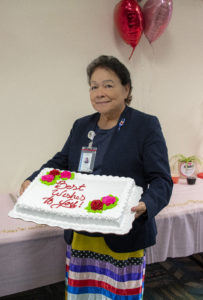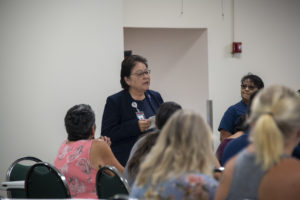Members of Tribal Council, friends, and family held a celebration for outgoing Tribal Secretary Camilla Wishkeno Chouteau on August 18, 2022, at the Old Bingo Hall to mark her retirement and a long career of serving the Nation. The celebrants shared memories and jokes at the reception, enjoyed refreshments and cake, and expressed their gratitude for Chouteau’s vital work in the Tribal Government and the PBPN Community. Chouteau was elected Tribal Secretary in 2014 and held the position for two consecutive terms. Previously, she had served as Secretary of the Constitutional Drafting Committee in 1974 and was elected Tribal Chairperson two years later in 1976.

Camilla Chouteau, PBPN Secretary, presents the cake during the celebration in honor of her service to the Nation.
One of the major reasons Chouteau became involved in the community and ran for office was because of her Great-Aunt, Minnie Evans. “She wanted us all to call her ‘Grandma.’ She assisted in raising my Father because my Father’s Mother passed away when he was 12 years old. And then my Father always wanted to keep us close to Grandma Minnie and her husband Bill.”
Minnie Evans was instrumental in defeating the U.S. government’s attempted termination of the Prairie Band Potawatomi Nation as a federally recognized tribe and led delegations to Washington, D.C. She also served on the Tribal Council Claims Committee, which was established to address outstanding grievances or claims against the United States for treaty breaches, unauthorized taking of land, unfair dealings, or inadequate compensation. It was this role Chouteau remembers most clearly as influencing her eventual entry into Tribal Government.
“At night, we’d always have Sunday dinner and, after that, in the evening, she’d turn all the lamps on and we’d have to sit there and listen to her read letters that she wrote to the superintendent up at Horton Agency and the claims attorney in Topeka, Kansas,” Chouteau said. “She’d hitchhike to Topeka at least once a week to go visit the attorney. She did not receive any pay for that. She would walk down probably half a mile to the corner to catch a ride with somebody who was going to work in Topeka, walk down a road with just a flashlight in a rural area, but she’d catch that ride. She’d go all day over there with that attorney, working on the claims for our Tribe. And then in the afternoon, she would call my Parents to come pick her up and bring her home. And that went on for a long time, at least once a week.”
“I got to listen to her, and I was really interested in it because it appeared to me, as I got older, that there ought to be something a Tribal Member can do to bring about change. Why was this all happening that we couldn’t seem to get ahead as a Tribe?”
Inspired by her Great-Aunt’s tenacity, Chouteau began her own journey of working for the betterment of the Tribe. Her first role in an official capacity was as Secretary of the Constitutional Drafting Committee, which established the Nation’s current constitutional government. She was then elected Tribal Chairperson and served a three-year term. Afterwards, Chouteau returned to college to earn a BA in Social Work Administration from the University of Kansas, where she would also later earn her Masters degree. She then married and moved to Oklahoma, but only three years after their son was born, her Husband, Lee, suddenly passed away. The loss prompted Chouteau to move back to Topeka with her son to be with her parents. This allowed her to raise her son in the Prairie Band Potawatomi community and slowly become involved with the Nation’s government and business again.
“I just read a lot, went to General Council Meetings, and tried to learn where our Nation was at that time. But I was dedicated to raising my son myself, so I waited until he was 17 and then decided to maybe get on a committee or something with the Tribe.”
She was asked to be on the Nation’s Health Board, and during her six years in that role, she assisted in planning the new Health Center. “It’s the most beautiful facility in Northeast Kansas, and I’m very proud of that because I think our tribal members are most deserving of excellent healthcare.”
In 2014, Chouteau ran for and won the position of Tribal Secretary. She was reelected in 2018 and is very proud of what the Nation has accomplished during her time serving in the Tribal Government, including the construction of several other facilities. “I just feel real honored that this happened when I was working with that Tribal Council and the Tribal Council we have today,” she said.

Camilla Chouteau, PBPN Secretary, addresses well wishers during her retirement celebration.
Chouteau has high hopes for the Tribal Council’s future work and how the Nation can develop further as she steps back from Government and Business leadership. “I think there’s a time when an individual needs to make a decision to explore other options in your life, like maybe other jobs or travel. I’m at that age and that’s what I’m going to do, but I wish all the best for our Tribe and Nation and the Tribal Council,” she said. “You have to sometimes yield to people younger than you. You know, they’re probably the most educated age group now, and I think that’s a real positive for the Tribe. Younger people have a lot of energy. Not that I don’t, but this is an energetic position, and it needs to be attended to.”
Although she is “retiring,” Chouteau has no plans of slowing down. In addition to traveling and spending time with her son and his Family in Saskatchewan, Canada, Chouteau has already set several goals of what she wants to accomplish in the years to come.
“I’m going to go volunteer at the Shawnee County election. We have an election coming up and I won’t have a full-time position, so that will give me time to do that,” she said. “And then I’ve already looked at the different boards that they have in Shawnee County, and I’m interested in the Jayhawk [Area Agency on Aging].” The Agency provides information, referrals, and services for older Kansans and their caregivers residing in Shawnee, Jefferson, and Douglas Counties, and offers many volunteer opportunities and ways to get involved.
In addition to continuing to serve her local community, Chouteau plans to visit with other tribes and travel to meaningful sites across the country. “I have a friend that is working on visiting other tribes to communicate with them and learn from them, and I want to do that too,” she said. “I want to go out to the Heard Museum of American Indian Art in Arizona.”
While some may imagine retirement as a resting period, She sees it as a way to continue working on her own terms. “A lot of people, when they retire, they just say, ‘Oh, I’m not going to do anything and just sit around. I’m too conditioned. I wake up at five o’clock every day, whether I like it or not, and I’m ready to go. I’m just interested in life.”
As she enters the next chapter of her life, she offers some advice to the next generation of Tribal leaders: “I think it’s real important, no matter who you are or where you come from, that you always keep in mind your culture, the Native Language, and the Ceremonies we have. Be involved!”
